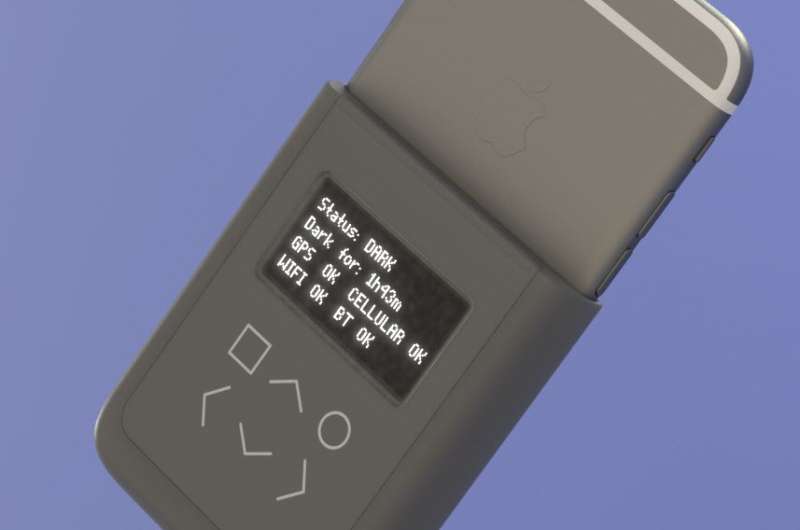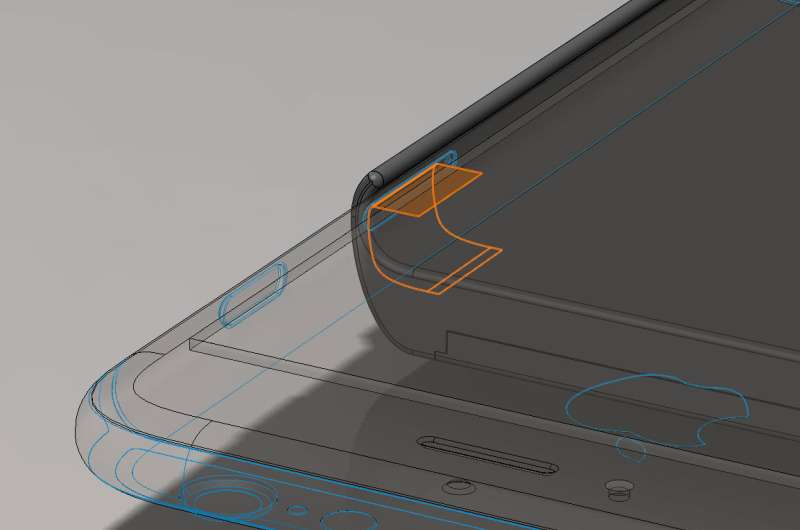Conceptual rendering of a “battery case” style introspection engine, piggybacked on an iPhone6. Credit: pubpub.org
(Tech Xplore)—Edward Snowden has been making news about an iPhone-related concept where a smartphone owner can tell if that person is being tracked.
"Unfortunately, journalists can be betrayed by their own tools. Their smartphones, an essential tool for communicating with sources and the outside world–as well as for taking photos and authoring articles–are also the perfect tracking device." Those were the words of Edward Snowden and Andrew "Bunnie" Huang.
They posted a discussion, "Against the Law: Countering Lawful Abuses of Digital Surveillance," where they laid out their idea for a case-like attachment to modify an iPhone.
Associate Editor David Priest, CNET, was one of numerous site writers reporting on the phone case concept, which is designed to do more than keep dust and raindrops off a precious iPhone.
The case could keep spies off from spying on precious you. Huang and Snowden were scheduled to present their design for the device.
Is someone, whether mischief makers or government agents, receiving information from your phone's radios? If you are a journalist in a trouble spot, for example, you would need to know.
Dan Goodin in Ars Technica said, "Once built, the 'field-ready' accessory would monitor various radio components inside the phone to confirm they're not transmitting data when a user has put the device into airplane mode."
Basically, Snowden and Huang have in mind an "introspection engine," said the BBC on Friday, which could keep an eye on radio components inside a smartphone.
Snowden and Huang discussed this: "Our work proposes to monitor radio activity using a measurement tool contained in a phone-mounted battery case. We call this tool an introspection engine. The introspection engine has the capability to alert a reporter of a dangerous situation in real-time. The core principle is simple: if the reporter expects radios to be off, alert the user when they are turned on."
The orange highlighted part is a proposed FPC which exits via the SIM card port and routes signals from the modified iPhone6 mainboard to the introspection engine’s electronics. Credit: pubpub.org
Ubergizmo said, "The case will warn users if the phone tries to transmit something that it's not supposed to, like GPS location even when it has been explicitly turned off by the user."
Huang and Snowden wrote that "The introspection engine will be an open source, user-inspectable and field-verifiable module attached to an existing smart phone that makes no assumptions about the trustability of the phone's operating system."
Is there a way of looking at this thing? It's not there yet. According to the BBC, Snowden said that making a 'field ready' version of the case will take about a year. "The two engineers are now working on turning their proposal into a working 'field ready' prototype that should be ready within 12 months."
The news is focused on the iPhone but Ars Technica said the introspection engine might one day work with a variety of smartphones.
Snowden and Huang wrote, "Thus we focus on a single phone model, the 4.7" iPhone 6 by Apple Inc., as the subject for field deployment. The choice of model is driven primarily by what we understand to be the current preferences and tastes of reporters. It has little to do with the relative security of any platform, as we assume any platform, be it iOS or Android, can and will be compromised by state-level adversaries."
The BBC offered some details on what the case would be like and look like: It would be built around a small self-contained computer. Its small screen would show a readout of the phone's cellular, GPS, wi-fi and Bluetooth status. Instead of being slotted into the phone, the SIM card would be inserted in the case.
The device could check how surveillance-free things are. How? Priest said it would check "by snaking wires through the SIM card port (the card itself will be moved to a new slot on the case) and monitoring the iPhone hardware for indicators of unwanted transmissions."
"From the outside," said Snowden and Huang, "the introspection engine will look and behave like a typical battery case for the iPhone 6. However, in addition to providing extra power to the iPhone 6, the case will contain the introspection engine's electronics core. The electronics core will likely consist of a small FPGA and an independent CPU running a code base completely separate from the iPhone 6's CPU."
TechRadar said that "Snowden and Huang's phone case will ensure a phone's radios are in fact completely disabled."
Lewis Leong in TechRadar commented that "While most citizens won't require the level of security that this phone case provides, journalists and political dissidents will undoubtedly find it useful."
More information: www.pubpub.org/pub/direct-radio-introspection
© 2016 Tech Xplore























